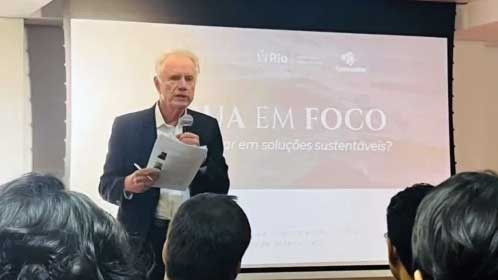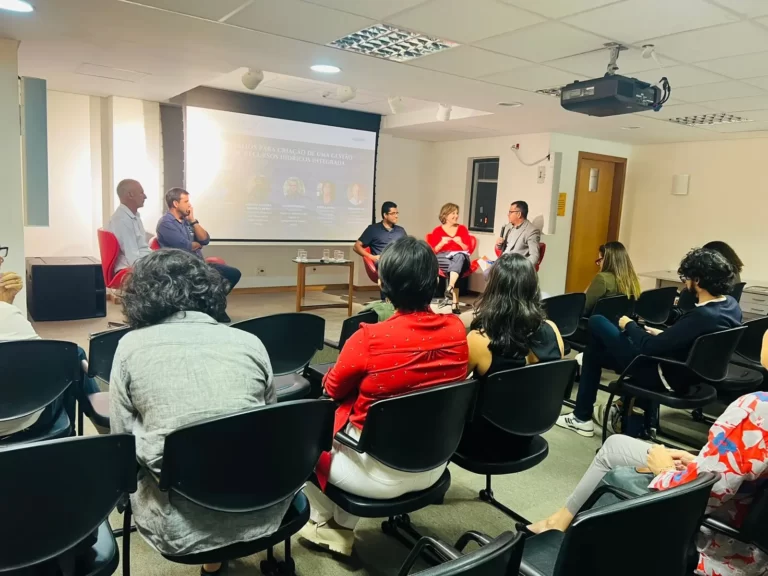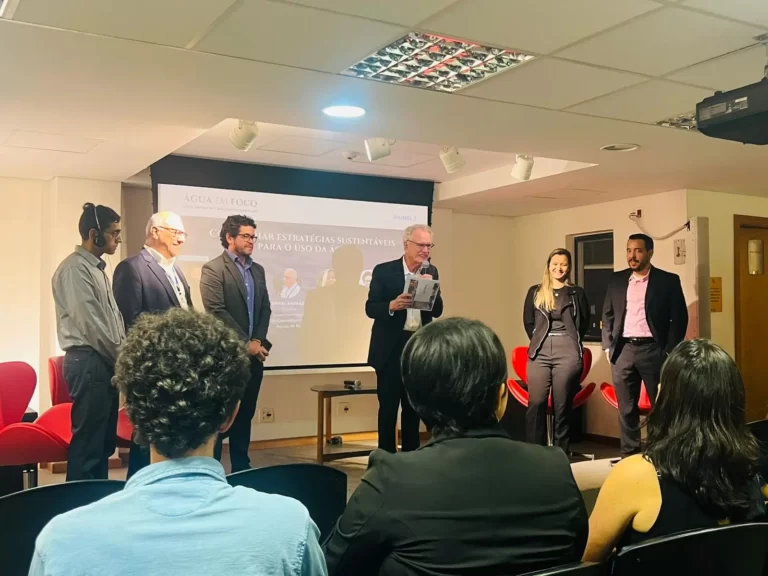Seminar on water resources discusses water management and its sustainable use
Climate Hub | Rio event highlights the importance of planning integrated public policies for water security and sustainable development
This news article was produced and written by our partner Comunitas. It was originally published on their website (in Portuguese).

Climate Hub | Rio, a Columbia University hub in Brazil dedicated to the production of knowledge related to climate issues, promoted last Tuesday (30) the seminar “Water in focus: How to reflect on sustainable solutions?”, in partnership with the City Hall of Rio de Janeiro and support from Comunitas.
In its first event since the Hub was launched, in March 2023, the objective was to bring together public managers, researchers, technicians, and students with an interest in the subject, to discuss the importance and challenges of integrated water resources management, as well as sustainable possibilities for water use.
The event featured two panels where different perspectives on the subject were discussed, from technical issues to social issues, also bearing in mind the impact of climate change on people's lives and water resources management.

Panel 1: Challenges for creating integrated water resources management
The first round of conversation fostered the debate on the need to implement a water resources governance system. The idea is to include the theme in the elaboration of public policies, in which governments, society, academia, and the private sector act together to strengthen policies that focus on the quantity and quality of water resources for current and future generations.
To discuss the theme, specialists from academia and government agencies were invited, such as the secretary of Metropolitan Integration of Rio de Janeiro, Aquiles Barreto, and his undersecretary, Henrique Silveira; the Environment Secretary of Nova Iguaçu (RJ), Fernando Cid; Professor at the Federal University of Rio de Janeiro (UFRJ), Estela Neves; and the professor at the National Water and Basic Sanitation Agency (ANA), Valmir Pedrosa.
Water inequality and water governance
Currently, more than two billion people live in countries that are experiencing water stress and Brazil is no exception, even though it holds 12% of the world's fresh water. And this situation is not restricted to the northeastern semi-arid region.
“Water inequality was also aggravated by the pandemic, creating a situation of global tension”, explained Professor Estela Neves. “And even though the United Nations (UN) declared, in 2010, water to be a basic and universal good, indispensable for human survival, water has been traded in futures contracts on the New York Stock Exchange. Therefore, we need to strengthen the State, effective policies for state capabilities and democracy”, she concluded.
For this governance to work, professor Valmir Pedrosa defends the need to create a Management Committee to promote joint action. “Collaboration is very important. It is fundamental to understand the difficulties that all fronts that take care of water resources face so that they can collaborate to solve the problem together. [It is necessary] to manage the gaps faced by communities living around rivers and their impact on society, which depends on them”.

Panel 2: How to foster sustainable strategies for water use?
In the second round of debates, sustainable strategies for water use were discussed. Considering that access to water, basic sanitation, and waste management is still very limited in the global scenario, it is necessary to develop tools and methodologies to better use the resource.
Representatives from academia, public agencies, and the private sector were invited to discuss the issue, such as environmental engineer and professor at Columbia University, Kartik Chandran; the professor of the University of Brasília (UnB), Carlos Lima, the director of the basic sanitation concessionaire, Águas do Rio, Sinval Andrade; ANA's specialist in water resources and basic sanitation, Sérgio Ayrimoraes; the deputy director of the Water Reuse Institute (Instituto Reúso de Água), Maíra Lima; and the president of the Baía de Guanabara committee, Adriana Bocaiúva.
Water reuse and basic sanitation
Approximately 50% of the sewage in the world is treated and only 11% is reused. In Israel, 90% of sewage is treated. Namibia has reused potable water since 1968. Singapore has 40% of its sewage treated, while Cyprus and Malta have 100% of its sewage treated. In Brazil, the situation is quite worrying: only 1% of sewage is treated.
To change this reality, it is necessary to think about how to implement initiatives to reuse water and strengthen the sanitation system. Legislation is still deficient about the reuse of drinking water by the population and sanitation still faces major challenges. Water treatment is essential to avoid, above all, tropical diseases (such as dengue fever, for example).
Another important issue is that, despite population growth being stabilized, there is a growing demand for water uses in Brazil for other purposes (such as irrigation), which can have a great impact on people.
ANA specialist, Sérgio Ayrimoraes, points out that a solution to this challenge lies precisely in the diversification of the water matrix, with water reuse, desalination, and waste reduction, to control demands and promote a rebalance considering water security.
“In addition, it is very important to carry out pollution control and accelerate the promotion of sanitation for the population. Today, in Brazil, most of the population lives without basic sanitation, with a lot of sewage for little water, and, even with advanced technology, miracles cannot be done with water. That is why it is so important to carry out sewage treatment planning”, he defended.
As for the issue of water reuse, the topic still faces challenges, such as the population's rejection of the product. The deputy director of the Water Reuse Institute, Maíra Lima, defends the importance of minimizing this aversion to the reuse of the liquid. “Water for reuse needs to be seen as a product and needs to convey confidence, security, and transparency, in addition to going through planning involving decision-makers. It is important to think about the purpose for which the reused water will be applied,” she explained.